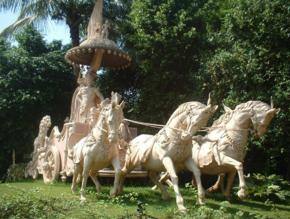How to look at life through Krishna’s eyes?

August 21 is Janmashtami – the birthday of the smiling Lord Krishna. He is the smart poster-boy of the Hindu pantheon, who taught us how to live life the smart way. Right from his birth in a prison cell, his life has been full of mighty challenges. But as a liberated soul Lord Krishna smiled his way through life’s situations unaffected. Behind his responses and smiles lies a philosophy that he personally advised to many of his close friends and devotees. What is this philosophy that will help us look at life through Lord Krishna’s eyes?
Bhagavan Shri Krishna is a historical person said to be born around 3220 BCE. Krishna's life is told primarily through the Bhagavatam, Garga Samhita, Vishnu Purana, Brahmavaivarta Purana, Mahabharata, Harivamsa and several other Puranas where he is the central hero and the Lord Supreme. Of the Puranas, the Bhagavata Purana and the Vishnu Purana elaborately tell the story of Krishna. Roughly one quarter of the Bhagavata Purana sing the praises of his life and philosophy.
Krishna is well known to be a master of all roles in which he simply created followers – be it as a child, a brother, a charioteer, a warrior, a friend, a statesman, a messenger, a philosopher, a disciple, a protector, a guru, a cowherd or the beloved of his devotees (gopis of Vrindavan).
Lord Krishna’s life story has all the rigmaroles of daily living that we face today. Mata Amritanandamayi says, "Throughout his life, Lord Krishna had to face different crises that arose like waves, one after the other. Even then, not once was his countenance clouded by sorrow. He faced every difficulty under the sun, but there was no place for sorrow in Sri Krishna's presence. He was the embodiment of bliss. In his company everyone rejoiced, forgetting all else. In his presence they tasted the bliss of the Self…"
About Krishna, Osho remarked “People like Krishna look at life with extraordinary eyes; their perception is rare. It penetrates the innermost depth of life, and it will be a great gift if for a while we can look at life through the eyes of Krishna. That will go a long way to change and deepen our own perception, our own perspective of life...”
Krishna is a central figure in Hinduism. His divinity and powers mesmerizes the minds of even the occasional bystander. Behind Krishna’s divinity and Lordship is a philosophy that he advised to anybody seeking a counsel. Remember his authoritative words to the warrior Arjuna in his divine song – The Holy Gita: “I shall now in full explain to you this knowledge together with its wisdom, knowing which leaves one nothing further to be known in this world.” (Chapter-7, verse 2)
Though Lord Krishna advised according to the ability of the person, there is a philosophy that one can make out from his advice. Many liberated masters, thinkers and scholars confirm that his advice as in the Holy Gita pretty much summarises his philosophy, which is not different to the vedantic declarations. The Vedanta teacher Swami Chinmayananda often said, "With the Gita, Shri Krishna took the knowledge of the Upanishads down from the Himalayas and into the marketplace."
About the Holy Gita Swami Shivananda remarks: “The Gita gives you practical lessons to regulate your daily life and conduct. It tells you how to overcome the above enemies, how to develop the divine virtues which will help you to attain God-consciousness. The message of the Gita is the message of sacrifice, love and duty. Love all. Share what you have with others. Do your duties well. Rise above petty likes and dislikes. Keep open the portals of your heart by removing selfishness, greed and lust, so that the Supreme Lord Himself may come and dwell therein. These are the lessons of the Gita.”
Here is a sample of some timeless wisdom from the Gita:
“Those who are wise grieve neither for the living nor for the dead’
“Without being attached to the fruits of activities, one should act as a matter of duty, for by working without attachment one attains the Supreme”
"You have a right to perform your prescribed action, but you are not entitled to the fruits of your action. Never consider yourself the cause of the results of your activities. Nor should you be attached to inaction."
“As a person abandons worn-out clothes and acquires new ones, so when the body is worn out a new one is acquired by the Self, who lives within”
“For him, who has conquered the mind, the mind is the best of friends; but for one who has failed to do so; his mind will remain the greatest enemy”
“As the blazing fire reduces wood to ashes, similarly, the fire of Self-knowledge reduces all Karma to ashes”
“Little by little, through patience and repeated effort, the mind will become stilled in the Self”
“The mind acts like an enemy for those who do not control it”
“Man is made by his belief. As he believes, so he is”
“Better indeed is knowledge than mechanical practice. Better than knowledge is meditation. But better still is surrender of attachment to results, because there follows immediate peace.”
“The power of God is with you at all times; through the activities of mind, senses, breathing, and emotions; and is constantly doing all the work using you as a mere instrument”
In its entirety, the Holy Gita with the commentaries written by many saints and teachers like Acharya Shankara, Shri Ramanuja, Shri Madhava and many others has the philosophy, which can dispel our ignorance. It is this very philosophy of the Gita that can help us to look at life differently.
No wonder Arjuna said at the end of the Gita discourse that “Destroyed is my delusion, as I have now gained my knowledge through your grace. I am firm; my doubts are gone.”
Happy Janmashtami.



